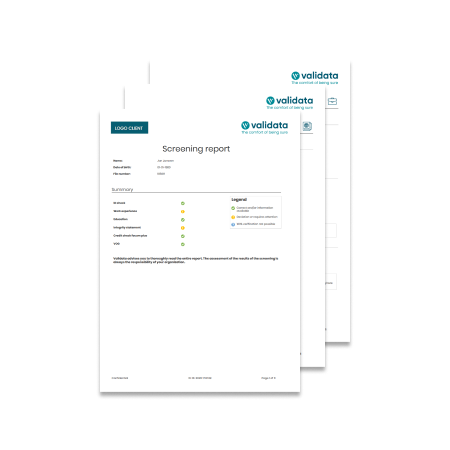Identity fraud among employees
Identity fraud is a growing challenge that can pose significant risks to both employers and employees. When someone uses a false identity to be employed, the company risks inadvertently violating employment laws, exposing itself to security risks and damaging its reputation. Identity fraud can range from trying to hide a criminal record, being unauthorised to work in certain sectors, or wanting to commit internal crimes such as data breaches.
As mentioned above, hiring someone who has a false identity without a sufficient background check can have serious consequences. Examples include a dentist who worked for years and harmed patients, a nurse who got a summer job using another person’s medical certificate, and a teacher who worked under a false identity at a school for a year before his criminal background was revealed.
Are employers obliged to check IDs for employment?
No, in Sweden you are not obliged to check IDs when hiring and many companies have an overly relaxed approach to ID checks. Some don’t do any ID checks at all while others do checks but take no further steps to find out if the IDs are genuine. It is the employer’s responsibility to ensure that the person you hire has the right to work in Sweden and has honest intentions. Therefore, it is always best to do a background check that includes an identity check before hiring.
Download our white paper on the basics of employment background checks.

What are valid IDs?
There are several types of valid IDs you can choose to check:
You can read more about valid IDs on the Police website.
Passport: A passport is an internationally recognized travel document issued by the police. It contains personal data such as a person’s name, date of birth, photograph and signature.
National ID card: The national ID card is an official identity document also issued by the police. It can be used as a proof of identity within the EU and the Schengen area and contains similar personal data as a passport.
Swedish ID card from the Swedish Tax Agency: This ID card is issued by the Swedish Tax Agency and serves as an official proof of identity within Sweden.
BankID: BankID is an electronic identification service used to enable secure digital identification and signing over the internet. BankID is linked to a person and in order to obtain it, the person must be a customer of a bank that offers the service and meet the bank’s requirements for identity verification.
Driving licence: A Swedish driving licence also serves as an identity document. It is issued by the Swedish Transport Agency and contains personal data and a photograph of the holder.
Laws and regulations on ID checks in recruitment and employment
When it comes to identity verification and handling personal data, there are a lot of laws and regulations you need to be aware of, such as the GDPR and the Discrimination Act.
How to properly handle employees’ personal data with regard to GDPR
When conducting an ID check on potential employees, it is important to remember that all processing of personal data must be done in accordance with the General Data Protection Regulation (GDPR), which has now replaced the Personal Data Act in the EU. The GDPR requires you to process personal data in a lawful, fair and transparent manner. This means that you must inform the candidate that a check will be carried out, what kind of information you will collect, and for what purposes this information will be used. It is crucial that you minimise the amount of data you collect to what is absolutely necessary for the purpose and that you protect this information from unauthorised access or use. Also remember that the candidate has the right to access the data you hold about them and can request that inaccurate data will be corrected or deleted.
Read more about GDPR and background checks in our white paper.
Take the Discrimination Act into account
The Discrimination Act aims to protect individuals from discrimination based on gender, transgender identity or expression, ethnicity, religion or other beliefs, disability, sexual orientation and age.
Regarding ID checks in employment, there are no specific provisions in the Discrimination Act that directly address this process. However, all employers’ actions, including recruitment and ID checks, must comply with the overall principles of the Discrimination Act. This means that all employment procedures, including requesting and checking identity documents, must be carried out in a non-discriminatory manner. For example, requests for identity documents should be justified and relevant to the recruitment process and should be applied uniformly to all candidates.
Risks and sanctions if you hire a person under a false identity
Hiring someone who has used a false identity comes with many risks:
- Legal penalties: When hiring someone who does not have the right to work in Sweden you risk being found guilty of violating the Aliens Act, which can lead to both imprisonment and fines.
- Security risks: An individual hiding their true identity can pose a security risk to your organisation, your employees and your customers. There may be ulterior motives behind the need to use a false identity.
- Damage to trust: The discovery that an employee has used a false identity can damage the company’s reputation. It may signal shortcomings in the company’s recruitment processes and internal controls.
- Financial losses: Companies may suffer financial losses related to investments in recruitment, training and salaries of an employee who later has to be dismissed due to a false identity.
Employment background checks help you prevent risks
To prevent the risks of hiring someone with a false identity, we recommend that you always carry out a pre-employment background check. By carefully checking and verifying a candidate’s personal data, work and education history and any criminal records, you reduce the risk of hiring people who are not honest about their identity.
At Validata, we offer various background checks so that you can get an overall picture of the candidate before hiring:
- Verification of identity: This check ensures that a candidate’s declared identity matches official documents such as a passport or ID card, which is essential to prevent identity fraud.
- Criminal record check: Checking an individual’s criminal record can identify any previous offences that may be relevant to the position in question, contributing to a safe working environment.
- Credit check: This check provides insight into a candidate’s financial stability and responsibility. This can be particularly relevant for positions involving financial responsibility or handling money.
- Education and diploma check: Verifies that the candidate actually has the educational qualifications and diplomas they claim. You can find out more about educational verification.
- Work experience verification: By confirming previous employment, roles and responsibilities, employers can get a more reliable picture of the candidate’s experience and skill level, and find out if the candidate actually worked there during the period indicated in the CV.
Handling of personal data in accordance with the GDPR is our top priority
For us, privacy and security are extremely important. That’s why we carry out all our background checks in compliance with the GDPR. Our screening software, Valluga, is secure and protects personal data against both loss and unauthorised processing. We are also ISO certified (27001 and 9001), which ensures that we have a high level of security when it comes to information management.
In addition to the ISO 27001 certificate, we have ISAE 3000 Assurance Reporting in place. The assurance framework consists of 100 controls in the areas of information security, privacy and operations. The measurement is carried out by an independent IT auditor and accountant who reports on our processes, procedures and working methods throughout the year. This report is then shared with you individually, providing a clear picture of our security measures and compliance with the GDPR.
Interested in knowing more about how we can help? Don’t hesitate to contact us.
Get an overall picture of who you are hiring through a digital report with our screening software
In Valluga, both you and the candidate get access to a digital control report where you can see any discrepancies immediately. In this way, you get an overall picture of the candidate and can make an informed recruitment decision.

Once the verification report is finalised, you and the candidate will be notified and can download the report.
Background checks within Sweden take up to 3 days. National checks take up to 10 days.
Contact us about ID checks when hiring personnel
Contact us
Contact us
"*" indicates required fields
Contact us
"*" indicates required fields
Download the white paper
Download the white paper
Download the white paper
Contact us
"*" indicates required fields
Thanks for registering!
"*" indicates required fields







